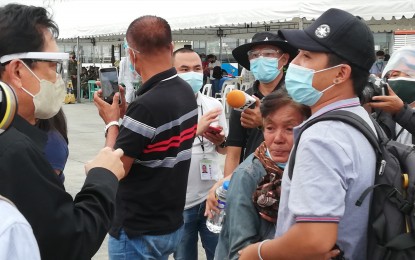News
Welcome and farewell: Final respects for ‘fallen heroes’

FINAL RESPECTS. Labor Secretary Silvestre Bello III (left) extends his condolences to Helen Zara (center), wife of Marino Zara, one of the 54 deceased OFWs whose remains arrived in the country on Tuesday (July 28, 2020). The government has assured assistance for the families of the deceased OFWs. (PNA photo by Joyce Rocamora)
MANILA – The arrival honors for deceased overseas Filipino workers (OFWs) whose remains were repatriated from Saudi Arabia at the Balagbag Ramp at the Ninoy Aquino International Airport (NAIA) on Tuesday gave an unparalleled focus on the very reason why they endured hardship abroad – to sustain their families back home aside from serving as the country’s modern-day heroes.
Among the bereaved families present during the ceremony were the Zaras – a heartbreaking picture in the middle of the NAIA’s flight line, with son Mark half-carrying his weeping mother Helen as they face the casket of their deceased patriarch Marino.
“Iyan pong aking asawa ay napakabait na anak sa magulang at sa aming pamilya. Inubos niya ang panahon niya sa pagpapa-aral ng mga anak pero sa totoo lang po, mahal na mahal po namin iyan (My husband is a very kind son to his parents and to our family. He spent most of his life working to send our kids to school. We love him very much),” Helen said in an interview.
Marino, who died of non-coronavirus disease 2019 (Covid-19) causes, had been working in Saudi Arabia for 13 years as a supervisor in a construction company. He died on May 19 at the age of 60.
Mark said his family’s only wish now is to be allowed to get one last glimpse of their father.
“Since hindi naman siya Covid-19, ang hiling naman baka mapagbigyan kami na makita ang papa namin kahit within 24 hours at masilip namin siya. Panawagan namin sa LGU (local government unit) ng Tagkawayan na ma-allow kami (Since it’s not Covid, we’re hoping that we would be given a chance to get a glimpse of him within that 24 hours. We’re appealing to the LGU of Tagkawayan to please allow us),” he said.
Marino Zara’s remains will be transported to his hometown in Tagkawayan, Quezon.
He was among the 54 Filipinos whose remains were repatriated from the kingdom, bringing the total count of repatriated deceased migrant workers to 191.
An initial batch of 49 remains of OFWs from Saudi Arabia arrived in the country on July 10 while another 88 bodies were repatriated on July 19.
Along with the Zaras were seven other families and government officials who graced the heroes’ welcome for the repatriated OFWs’ remains, led by Labor Secretary Silvestre Bello III, Foreign Affairs Undersecretary Sarah Lou Arriola, and Hans Leo Cacdac, administrator of the Overseas Workers Welfare Administration (OWWA).
“I’m hoping this is the last batch of dead OFWs arriving not because the government is tired of receiving them but due to the fact that it’s very painful to welcome dead heroes who served their families and country well,” Bello told reporters.
He said the remains of those who were not included in the latest batch might be brought home via a commercial flight in the next repatriation efforts.
“I salute to these fallen migrant workers. Fallen because like soldiers, they don’t choose where to be taken. All they choose is to protect the future of their loved ones and their homeland,” Bello said.
Meanwhile, he noted that assistance would be extended to the immediate families of the deceased – a total of PHP20,000 and another PHP100,000 if they are active members of OWWA.
“If they are insured, they will receive an insurance benefit of USD10,000 but if they died of Covid-19, they will be entitled to insurance benefits of USD15,000,” Bello said.
He noted that the government had facilitated in the past the return of deceased Filipinos from other countries but none is similar to the mass repatriation of Filipino remains from Saudi Arabia.
“In the case of Saudi Arabia, there was a letter from the Kingdom of Saudi Arabia that they wanted us to send (them) home immediately or they will bury them there. So we had to come up with this immediate action,” Bello said.
He, however, assured that repatriation efforts in other countries funded by the government would continue.
Cacdac likewise shared that compared to other Middle East countries, the “backlog” in the number of fallen Filipinos who needed to be repatriated was far greater in Saudi Arabia.
“That’s the reason why nagkaroon ng (we had this) mass repatriation effort – historic mass repatriation. Mayroon na rin talagang plano na maiuwi ‘yong iba (There have been plans to repatriate the others),” he told the Philippine News Agency (PNA).
This was the latest batch in the government’s “historic” mass repatriation for deceased overseas Filipinos abroad.
Of this number, 39 passed away due to Covid-19 while the rest died of other causes.
The latest repatriates were transported from different areas in the kingdom, such as in Al Khobar, Jeddah, and Riyadh.
Upon the arrival of the remains, the caskets of those who passed away due to Covid-19 were immediately disinfected and blessed before being brought to crematoriums. (With reports from Ferdinand Patinio/PNA)





















